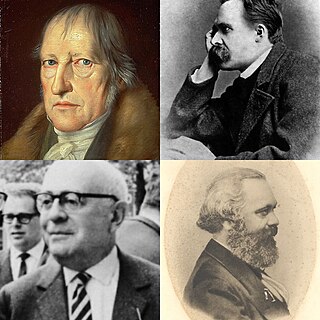Metaphilosophy, sometimes called the philosophy of philosophy, is "the investigation of the nature of philosophy". Its subject matter includes the aims of philosophy, the boundaries of philosophy, and its methods. Thus, while philosophy characteristically inquires into the nature of being, the reality of objects, the possibility of knowledge, the nature of truth, and so on, metaphilosophy is the self-reflective inquiry into the nature, aims, and methods of the activity that makes these kinds of inquiries, by asking what is philosophy itself, what sorts of questions it should ask, how it might pose and answer them, and what it can achieve in doing so. It is considered by some to be a subject prior and preparatory to philosophy, while others see it as inherently a part of philosophy, or automatically a part of philosophy while others adopt some combination of these views.
Postmodern philosophy is a philosophical movement that arose in the second half of the 20th century as a critical response to assumptions allegedly present in modernist philosophical ideas regarding culture, identity, history, or language that were developed during the 18th-century Age of Enlightenment. Postmodernist thinkers developed concepts like difference, repetition, trace, and hyperreality to subvert "grand narratives", univocity of being, and epistemic certainty. Postmodern philosophy questions the importance of power relationships, personalization, and discourse in the "construction" of truth and world views. Many postmodernists appear to deny that an objective reality exists, and appear to deny that there are objective moral values.

Hilary Whitehall Putnam was an American philosopher, mathematician, computer scientist, and figure in analytic philosophy in the second half of the 20th century. He contributed to the studies of philosophy of mind, philosophy of language, philosophy of mathematics, and philosophy of science. Outside philosophy, Putnam contributed to mathematics and computer science. Together with Martin Davis he developed the Davis–Putnam algorithm for the Boolean satisfiability problem and he helped demonstrate the unsolvability of Hilbert's tenth problem.
Analytic philosophy is a branch of philosophy using analysis, popular in the Western world and particularly the Anglosphere, which began around the turn of the 20th century in the contemporary era in Germany, the United Kingdom, United States, Canada, Australia, New Zealand, and Scandinavia, and continues today. Analytic philosophy is often contrasted with continental philosophy, coined as a catch-all term for other methods, prominent in Europe.

German philosophy, meaning philosophy in the German language or philosophy by German people, in its diversity, is fundamental for both the analytic and continental traditions. It covers figures such as Gottfried Wilhelm Leibniz, Immanuel Kant, Georg Wilhelm Friedrich Hegel, Karl Marx, Friedrich Nietzsche, Martin Heidegger, Ludwig Wittgenstein, the Vienna Circle, and the Frankfurt School, who now count among the most famous and studied philosophers of all time. They are central to major philosophical movements such as rationalism, German idealism, Romanticism, dialectical materialism, existentialism, phenomenology, hermeneutics, logical positivism, and critical theory. The Danish philosopher Søren Kierkegaard is often also included in surveys of German philosophy due to his extensive engagement with German thinkers.

Richard McKay Rorty was an American philosopher. Educated at the University of Chicago and Yale University, he had strong interests and training in both the history of philosophy and in contemporary analytic philosophy. Rorty's academic career included appointments as the Stuart Professor of Philosophy at Princeton University, Kenan Professor of Humanities at the University of Virginia, and Professor of Comparative literature at Stanford University. Among his most influential books are Philosophy and the Mirror of Nature (1979), Consequences of Pragmatism (1982), and Contingency, Irony, and Solidarity (1989).
Continental philosophy is a term used to describe some philosophers and philosophical traditions that do not fall under the umbrella of analytic philosophy. However, there is no academic consensus on the definition of continental philosophy. Prior to the twentieth century, the term "continental" was used broadly to refer to philosophy from continental Europe. A different use of the term originated among English-speaking philosophers in the second half of the 20th century, who used it to refer to a range of thinkers and traditions outside the analytic movement. Continental philosophy includes German idealism, phenomenology, existentialism, hermeneutics, structuralism, post-structuralism, deconstruction, French feminism, psychoanalytic theory, and the critical theory of the Frankfurt School as well as branches of Freudian, Hegelian and Western Marxist views. There is widespread influence and debate between the analytic and continental traditions; some philosophers see the differences between the two traditions as being based on institutions, relationships, and ideology rather than anything of significant philosophical substance.
Contemporary philosophy is the present period in the history of Western philosophy beginning at the early 20th century with the increasing professionalization of the discipline and the rise of analytic and continental philosophy.

In the fields of philosophy, the terms obscurantism and obscurationism identify and describe the anti-intellectual practices of deliberately presenting information in an abstruse and imprecise manner that limits further inquiry and understanding of a subject. The two historical and intellectual denotations of obscurantism are: (1) the deliberate restriction of knowledge — opposition to the dissemination of knowledge; and (2) deliberate obscurity — a recondite style of writing characterized by deliberate vagueness.

Peter Guy Winch was a British philosopher known for his contributions to the philosophy of social science, Wittgenstein scholarship, ethics, and the philosophy of religion. Winch is perhaps most famous for his early book, The Idea of a Social Science and its Relation to Philosophy (1958), an attack on positivism in the social sciences, drawing on the work of R. G. Collingwood and Ludwig Wittgenstein's later philosophy.
This glossary of philosophy is a list of definitions of terms and concepts relevant to philosophy and related disciplines, including logic, ethics, and theology.
Philosophy is the study of general and fundamental problems concerning matters such as existence, knowledge, values, reason, mind, and language. It is distinguished from other ways of addressing fundamental questions by being critical and generally systematic and by its reliance on rational argument. It involves logical analysis of language and clarification of the meaning of words and concepts.
This is a list of lists of philosophers, organized by subarea, nationality, religion, and time period.
Women have made significant contributions to philosophy throughout the history of the discipline. Ancient examples include Maitreyi, Gargi Vachaknavi, Hipparchia of Maroneia and Arete of Cyrene. Some women philosophers were accepted during the medieval and modern eras, but none became part of the Western canon until the 20th and 21st century, when some sources indicate that Susanne Langer, G.E.M. Anscombe, Hannah Arendt and Simone de Beauvoir entered the canon.
Western philosophy refers to the philosophical thought and work of the Western world. Historically, the term refers to the philosophical thinking of Western culture, beginning with the ancient Greek philosophy of the pre-Socratics. The word philosophy itself originated from the Ancient Greek philosophía (φιλοσοφία), literally, "the love of wisdom" Ancient Greek: φιλεῖν phileîn, "to love" and σοφία sophía, "wisdom").

British philosophy refers to the philosophical tradition of the British people. "The native characteristics of British philosophy are these: common sense, dislike of complication, a strong preference for the concrete over the abstract and a certain awkward honesty of method in which an occasional pearl of poetry is embedded".

Sally Haslanger is an American philosopher and the Ford Professor of Philosophy in the Department of Linguistics and Philosophy at the Massachusetts Institute of Technology.

Maria Baghramian is Full Professor of Philosophy in the School of Philosophy, University College Dublin (UCD) and Professor II, at Department of Philosophy, University of Oslo (2023-2026). She was elected a member of the Royal Irish Academy (RIA) in 2010 and a member of Academia Europaea in 2021. Baghramian has published twelve authored and edited books as well as articles and book chapters on topics in epistemology and twentieth century American Philosophy. She was the Chief Editor of the International Journal of Philosophical Studies (IJPS) from 2003 to 2013. She was the co-editor of Contemporary Pragmatism (2014–2022).








